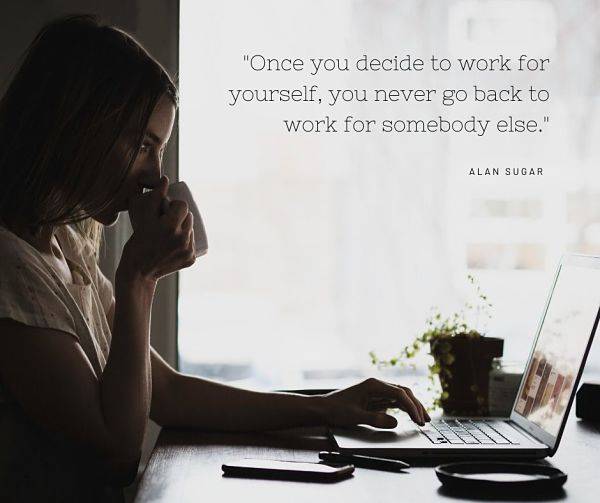Working for Yourself: Why It Makes Sense
Working for Yourself: Why It Makes Sense
Working for yourself sounds like a dream, doesn’t it? The thought of working for yourself but with a significant initial investment is a show stopper for most people. However, this isn’t always the case. There are many opportunities where you start with an initial small investment and get a considerable profit.
Why does it make more sense for some people to work for themselves than to work for somebody else? These people are often smarter than their boss believes them to be. The same people think they can do more than being confined in an office environment. They feel the need to make a difference.
There’s no such thing as job security nowadays. If you’re the type who likes challenges, is self-sufficient, visionary, and responsible, it wouldn’t be such a loss if you suddenly lose a job. You might decide to take matters into your hands and go the self-employed or entrepreneurial route.
Why should you work for yourself instead?
See fifteen possible reasons below:
1. You have more to offer than what your job is offering you.
Yes, the 9-to-5 job idea sounds appealing to those who just want to work like machines and limit their creativity and potential. Most of the jobs out there don’t offer you the chance to contribute new ideas, increase sales figures, improve the work environment, or create change in the company.
2. Being in an office can be a waste of time.
The typical routine job requires you to travel to your office. You’ll be in the office for eight hours or more per day so that they can see you. Most of the time, a job does not require that amount of time. Time is wasted just for the sake of being in an office. It’s a known fact that people have better work performance in places where they have fewer distractions.
3. Your dreams are bigger than what any company can offer you.
Have the freedom to achieve whatever you want without anyone telling you to stop. What can be more meaningful than knowing you’re doing it all for yourself?
4. If you have foresight, can think out of the box, a problem solver, and decisive, working for yourself makes sense.
You want to make things happen, not waste your time dealing with red-tape or indecisive people. Focusing on mind and creativity into your project yields great results.

5. No need for a dress code when working for yourself.
Depending on the business you want to be in, you can dress according to your personality. Working in a corporate environment sometimes requires you to wear clothes that are not your style at all. You probably can’t even afford to buy fashionable office clothes as they can be expensive.
A good chunk of your money is spent on buying clothes, transportation going to the office, and outside food. You don’t have to spend this much when you work for yourself.
6. Having a boss really sucks.
Only a few people are born to be bosses and fewer good ones. The bad bosses don’t recognise the potential of their employees. They just want employees to do what they are told. OK, most bosses share leadership memes on social media and imagine that they inspire others. In reality, true leaders are scarce.
You’re always being watched, monitored, judged and told what to do. You get told when to arrive when to leave—it’s like someone is making all the decisions in life for you. Perhaps this is no way to live.
7. A salary is not the best gauge of your knowledge and what you can contribute to the job.
Some companies don’t recognise the true worth of their employees. They get paid so little yet end up doing so much. This set-up brews resentment and unhappiness. Unhappy people don’t work well and are less motivated, which results in high attrition rates.
8. Choose your own hours of the day to work in.
This is one of the top reasons in choosing to work for yourself. Having your own flexible working hours allows you to plot your day accordingly. The quality of life is improved with flexible working hours because you have a good work-life balance.
However, working for yourself does not mean you laze around all day doing nothing, as it will bring you no income. You must be disciplined enough to follow a schedule and stick to it.
9. There are no limits.
It’s good to have no limits as you may get some unexpected positive results. Nothing holds you back. The sky’s the limit!

10. Follow your passion.
Companies are born out of passion. Doing what you love will bring you more satisfaction. In most cases, what you love is also what you’re talented at. Love your job and what you do, because if you are frustrated at work, all that negativity will have an impact on your personal life. Following your passion will allow you to stay more positive.
11. You’ll become stronger with time.
Working for yourself will sure have its impact on your maturity level. That’s why it’s a good step from this point of view. You’ll have to overcome many bumps in the road, which will forge resilience and tenacity, and you’ll be a better entrepreneur as time passes.
12. You’ll improve in all aspects of life.
Working in an office environment can be monotonous—there’s often little to no room for improvement. Working for yourself will allow you to discover what’s meaningful to you. You can find out your true calling and how you can achieve your highest potential.
13. Have a sense of accomplishment that you’ve done something to be proud of.
Not everyone will readily admit it but us humans are proud creatures. We like to look at our accomplishments. Our accomplishments are testaments to what we fought for, the respect we earned, and that our lives meant something.
14. You’ll feel more alive than ever.
Being in control of your life gives you that sense of being alive. It’s an intoxicating feeling. Who doesn’t want that?
15. You get to spend more time with your family
While working is essential for us to have a decent lifestyle, working for yourself will help you see your family more often. You have a life that doesn’t revolve around work alone. You’ll be there when your family needs you. You get to make your own life, work as well as be around your family when they need you. Work-family balance is essential.
There are good reasons why working for yourself makes sense. Before stepping up and making that decision, ask yourself if you can handle the rough patches that come with it.
You shouldn’t be afraid of failure. Strive to continue and saunter on, don’t lose your focus. Moreover, be realistic in your goals. Yes, working for yourself is in some ways, freedom, but not freedom from responsibilities. Working for yourself is just as serious as working for a company where you have to deliver excellent results.
It is not all about business planning. According to Scott Gerber, “Business planning isn’t a revenue-generating opportunity. Get started on your business so you can make money as soon as possible.” Don’t get stuck because you don’t have a business plan in place. What you need to know is you need you. No one else will do the job. You can motivate yourself it in a manner that it gives results.
Great Ideas: Follow Inspiration or Choose Proven Paths?
Great Ideas: Is It Better to Follow Inspiration or Choose Proven Paths?
It’s great ideas that produce moonshots; at the same time, most entrepreneurs agree that it’s not about the concept; it’s the execution that determines success.
Today’s world pushes us into wanting more and alleviate ourselves from our current state. What can this do to us and our lives? Should you go where the flow of inspiration takes you, or should you follow a proven path?
You won’t know for sure until you have tried and seen the result. However, if given a choice, it makes sense to try and quantify the good and the bad parts of each, before choosing between creative ideas or proven paths.

Following your ideas
Creating something new is a challenge and most of us like challenges. Some people believe that new ideas are the only ones that will work because of their freshness. But this reason is not good enough for a plan to flourish.
When going down this road, prepare ahead and know the possibilities your path may lead. Do not show too much confidence, or you’ll be extra disappointed by likely failures along the way. Don’t begin in a pessimistic light, or you will fail without even starting—the best entrepreneurs balance positivity with a humble disposition.
If you visualise success, you’re more likely to achieve it. That brings you more confidence in yourself and your capacity. Visualisation is such a powerful thing, and it represents a big part of why everything works out. Believing in yourself, and visualising positive results will increase your confidence. However, visualising means nothing without the right path on track. But is this enough for a business to grow? Don’t you need a plan? Have a clear map to follow to your success.
Do not let anyone get you down. While businesses take time to make money, people may underestimate the potential your business or your ideas have. It has been demonstrated over and over that it takes time, commitment, and hard work to raise a company off the ground.
Pros
- New ideas will always pop up in creative people’s minds. They’re compelling and exciting.
- You might struggle more in the early stages of your project before you see success, but results are likely to be better in the long run.
- You’ll have a better sense of accomplishment when you come up with a solid idea and succeed at it.
- Starting with your dream gives you more chance of getting deeply involved, of making it your own and crafting every little thing about the business.
- You can shape it any way you want without involving others, as they do not know your plan.
- You will not be side-tracked. Your ego will meet less resistance, as it is your plan, your creation.
Cons
- If an idea pops up and you’re not able to execute it correctly, the whole process may go to waste.
- Failure will feel worse if you follow your creativity. Others, perhaps most won’t ‘get it’.
- You may lose the confidence you struggled to have.
- The guilt of letting your family down is worse in this case.
- The work you put into it is more significant than in a proven path business.
- You may lose your courage to try something new again.
- You’re likely to fail, look back and realise that you were crazy to even try.
When creating your path, pay attention to what works and what doesn’t. If you see that something had a good impact, repeat it. If it didn’t, create a new way and see how it better works for you. You can learn from yourself.
Sometimes, the things you are scared of but intuitively think will work turn out the way you expect them to. That is when maximum satisfaction occurs.
The strategy is essential for your success. To have a good outcome, have a plan in place to follow. At the same time, be ready to adjust the sails during your voyage.

Choosing a proven path
While choosing a proven path will not guarantee your success, many people would rather choose this more straightforward plan of action. They’re the same people who would one day be awakened to the reality that copying successful people won’t necessarily make you a successful person. While following a proven path may be a comfort zone, it’s not a sure answer for success.
To achieve the same success as previous entrepreneurs, know the difference between you and them, between what you have put into your business and what they did. Let’s explore the pros and cons of choosing a proven path.
Pros
- You feel reassured that if it worked once, it’d work again.
- You have that positive feeling that’s important when starting a business.
- You can tweak a sure thing, to make it even better.
- You can learn from other peoples mistakes.
- You have a clear path to follow—you cannot get sidetracked.
- Your plan is more straightforward—ticking each part of this path may get you faster to results than an idea that has never been used before.
- You don’t have to do so much work and research beforehand.
Cons
- It is dangerous to compare yourself to others’ success stories. If you don’t get the same results in the same amount of time, you might feel there’s something wrong with you.
- The proven path’s business values may not be the same as yours. Have well-defined core values that you truly believe in and follow.
- Copying a plan without believing in it is bound to yield negative results. You won’t be able to create a good connection between your yourself, your business, and your clients.
- You may get overconfident it works and not put enough work into it. Expect failure in this scenario.
It’s been said that the best and easiest way to success is to follow the path successful people have taken. It’s a challenge to be able to apply the same route to yourself. That’s where the tricky part is.
You can read some proven facts, get inspiration from success stories, but that doesn’t mean you have to follow each step. Make it your own success story, one that you believe in.
The only thing that will make you more likely to be successful is by working hard. There’s rarely such thing as being wealthy without working your ass off for years. (If you were born with a silver spoon in your mouth, you’d know already!)
Don’t merely copy successful people; use them as a guide. Identify their behaviours, both the good and the bad. Use those behaviours as a learning tool. That way, you can shape your business as your own. Awareness increases your likelihood of success.
Working hard is essential, but you have to take some time off too. Taking plenty of breaks gives you the space to think and see a new perspective. You can recalibrate and think of new ways to improve your game plan.
People are generally creative. It’s creativity that urges them to start their own business. They’re tired of working for other people, following their rules, suppressing innate creativity. Many great ideas are floating around. But the question is, how many of these great ideas make enough money for you to live your desired lifestyle? Is it worth the risk? Do you have a backup just in case of failure?
Know your true potential without comparing yourself to others. When desiring to pursue new ideas, know that great ideas aren’t great if you’re not making money out of them. After all, isn’t this the end goal?



